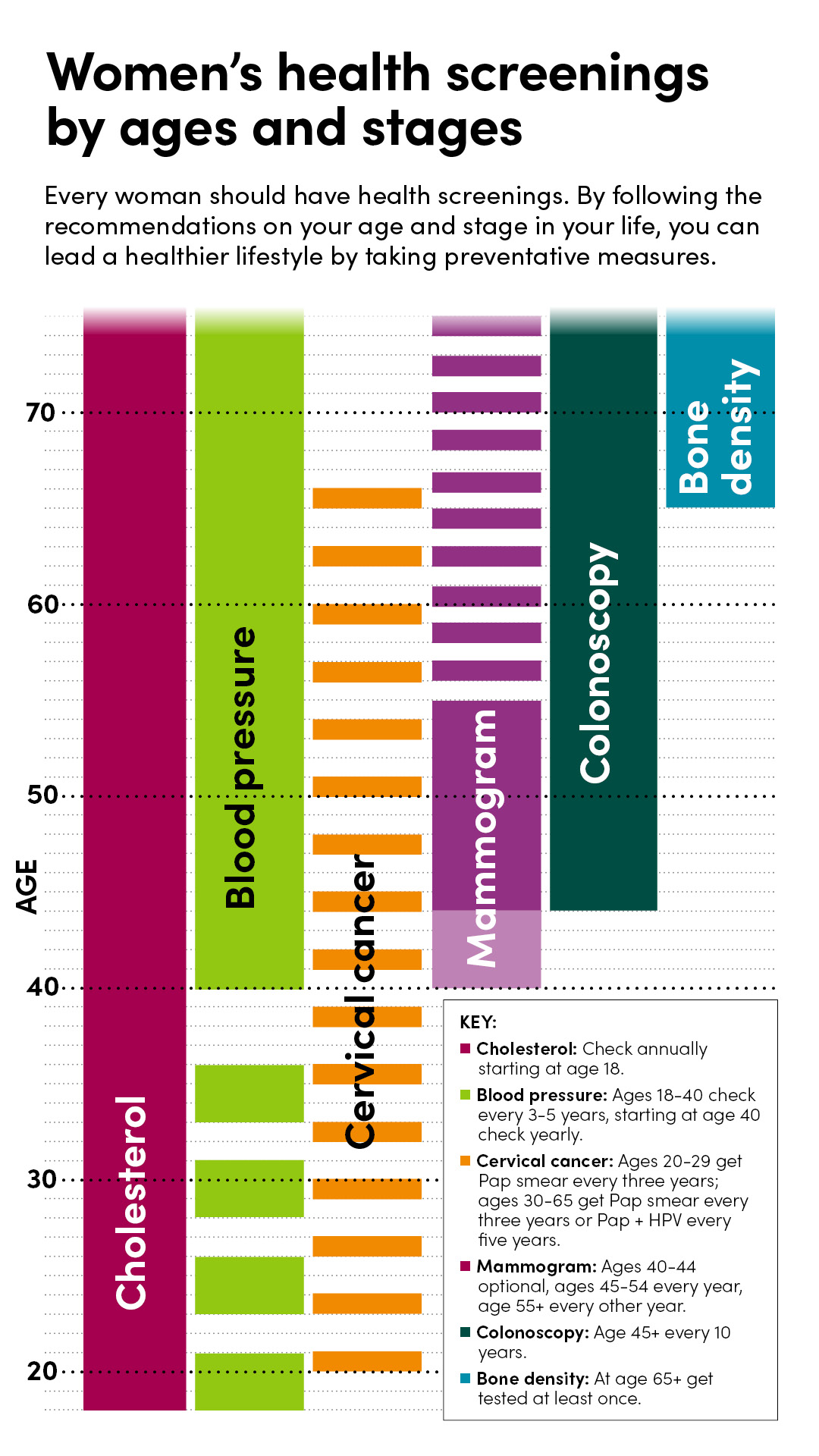Women’s health screenings by ages and stages
April 23, 2024Categories: Women's Health
Tags: Cancer Screening
Every woman should have health screenings. By following the recommendations on your age and stage in your life, you can lead a healthier lifestyle by taking preventive measures.
Cervical cancer screenings
Cervical cancer screenings (Pap smear) detect changes in the cervix before they become cancer. A Pap smear involves a speculum inserted into the vagina followed by a gentle swab of the cervix to collect cervical cells, which are later sent to the lab.
The screening is important because there are usually no symptoms of pre-cancerous cervical changes. Pap smears should begin at age 21 regardless of the onset of sexual activity.
For a woman at average risk, see when to have a screening based on your age.
- Women age 21-29 need to receive a Pap smear every three years.
- Women ages 30-65 need to have a Pap smear and a human papillomavirus (HPV) test every five years or only a Pap smear every three years.
Each year, 15,000 women in the U.S. are diagnosed with cervical cancer.
Pelvic exams
Pelvic exams are an evaluation of the external and internal genitalia and pelvic organs, such as the cervix, uterus and ovaries. During a pelvic exam, a Pap smear may be included to check for cervical cancer.
According to The American College of Obstetricians and Gynecologists, women should have regular pelvic exams if they’re pregnant, at risk for gynecological conditions, or are experiencing symptoms.
Mammograms
Mammograms are a screening to look at breast tissue. During the mammogram, your breasts will be compressed, but it shouldn’t cause any pain; it’s described as a tight, heavy feeling on your breasts that will only last a few seconds.
The following American Cancer Society guidelines are for women at average risk for breast cancer.
- Women ages 40-44 have the option to begin mammograms every year.
- Women ages 45-54 should get mammograms every year.
- Women 55 and older can have a mammogram every other year or continue with mammograms every year.
- Screening should continue as long as a woman is in good health and expected to live 10 years or more.
Colonoscopy screenings
A colonoscopy is a procedure used to detect changes or abnormalities in the large intestine (colon) and rectum. The procedure is done by using a long, flexible tube (a colonoscope) that has a light and tiny camera on one end. It’s put into your rectum and moved into your colon.
Your doctor will be able to remove abnormal growths, polyps and small amounts of tissue for analysis if needed. Most importantly, colonoscopies are performed as a screening tool for early detection of colorectal cancer which is the third most common cancer in the U.S.
Women age 45 or older at average risk should have a colonoscopy every 10 years. Other options include DNA stool tests every three years or fecal blood tests every year.
Bone density tests
Bone density tests are used to assess the strength of the bones and the probability of fracture in persons at risk for osteoporosis. The dual-energy X-ray absorptiometry (DEXA) scan takes about 10-15 minutes and measures the bone loss in your hips and spine. The DEXA scan is similar to having a standard X-ray with only a very small amount of radiation being used.
Women who are 65 years or older should have a bone density test at least once.
Blood pressure screenings
Blood pressure is the force of blood flowing through your blood vessels. Your blood pressure is determined by two numbers: systolic and diastolic pressure.
Systolic blood pressure – the top number – measures the force your heart pushes on your artery walls each time it beats. Diastolic pressure – the bottom number – measures the force your heart pushes on your artery walls in between beats or at rest. Ideally, your blood pressure would be less than 120/80.
To help manage your blood pressure, it’s important to control your stress levels and use coping strategies like exercising, getting plenty of sleep, and limiting salt, alcohol consumption and smoking.
If you’re going in for your annual wellness exam, your primary care provider’s nurse will take your blood pressure to monitor your health. If you aren’t going in for your annual exam, women ages 18-40 should have their blood pressure taken at their doctor’s office every 3-5 years. After the age of 40, it’s important to have yearly screenings.
Cholesterol Screenings
Cholesterol is a waxy substance produced by the liver that circulates through your blood. Cholesterol is needed by your body to help build cells and create vitamins and hormones.
Too much cholesterol causes buildup along the inner walls of your arteries and makes it more difficult for blood to flow throughout your body. An ideal cholesterol reading is less than 200.
Women ages 18-54 should have their cholesterol checked every 5 years
Women ages 55- 65 should have their cholesterol checked every 1-2 years
Women older than 65 and older should have their cholesterol checked at their annual wellness exam.
Women ages 18-54 should have their cholesterol checked every 5 years
Women ages 55- 65 should have their cholesterol checked every 1-2 years
Women older than 65 and older should have their cholesterol checked at their annual wellness exam.
=

